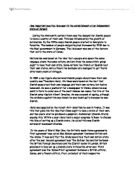To What Extent was the Zionist Movement the Main Factor in the Foundation of the State of Israel?
Rafi Addlestone
To What Extent was the Zionist Movement the Main Factor in the
Foundation of the State of Israel?
The State of Israel was inaugurated on 14th May 1948 by David Ben-Gurion in what is now Independence Hall in Tel-Aviv. Since then Israel has had a turbulent history, the situation today maintaining this violent trend. The issue that arises from an examination of this creation of the State of Israel, occurring when it did, is whether the establishment in 1948 came as a result of the recent events surrounding the Second World War and the Holocaust or whether it was inevitable, as a result of the sustained pressure from the Zionist movement in the political scene or of the foundations laid in preparation for statehood during the early 20th century by ‘practical Zionists’ who organised immigration and built up the land. The issue simply therefore, is whether the long term factors of the Zionist Movement or the short term events preceding May 1948 are the main reasons for the foundation of the State.
The ‘father of Zionism’ is traditionally seen as Theodore Herzl, a secular, Austrian Jew, who was moved to consider the ‘Zionist ideal’ of a Jewish state by the 1894 Dreyfus trial in France: “a watershed in Jewish History”. Jews everywhere asked themselves what had gone wrong with Jewish life to lead to the blatant anti-Semitism witnessed at the trial. However, the Zionist movement began long before Herzl made it a public issue with his 1st Zionist Congress in Basle in August 1897. Zionism is simply “the ideology of Jewish nationalism”, a movement which aimed to create a secured home for the Jewish people in the area known as Palestine, regarded as the Biblical home of the Jews. According to Heater & Berridge, this movement emerged out of the “combination of intellectual reaction against the failure of assimilationist liberalism in Western Europe … and the exclusion of large numbers of Jews from increasingly nationally defined states in East and Central Europe, in particular Russia” where movements such as Lovers of Zion (Hovevei Zion) were founded, urging the emigration of Jews to Palestine as over 2 million Jews fled Russia due to the pogroms following the assassination of Tsar Alexander II in 1881. Jews across Europe were failing to assimilate or being expelled, as Leon Pinsker said “anti-Semitism will persist where the Jews are a minority; they need a homeland of their own.” Heater & Berridge’s interpretation is contested by Hutchinson who suggests that Zionism came about “due to the failures of traditional religious structures and universal ideologies to provide Jews with a sense of direction in the modern world” meaning that Jews needed a search for a homeland to define them as a people. Both political interpretations attribute the formation of the Zionist movement to the nationalistic trend of the Western European Enlightenment of the 19th century, however, I think that Zionism is different in nature from other nationalist movements. Judaism is both a religion and a nation, with unique problems from other racial groups due to this fusion, as anti-Semitism is both religious and national hatred. I think that Herzl’s personal judgement in his book Der Judenstaat is the correct analysis, although his ideas are preceded by the likes of Pinsker and Moses Hess in Rome and Jerusalem (1862). He states that anti-Semitic fervour, rife in the 19th Century culminating in the Dreyfus trial, made a state for the Jews a necessity. Herzl identifies the ‘Jewish Problem’ as a nation plagued by anti-Semitism which meant that failure to assimilate lead to exclusion and repression as seen in Russia and that assimilation itself, and the commercial competition that this process would involve lead to anti-Semitism, especially since assimilated Jews tended to be successful due to their community links and a need to prove themselves in their newly adopted secular world.







